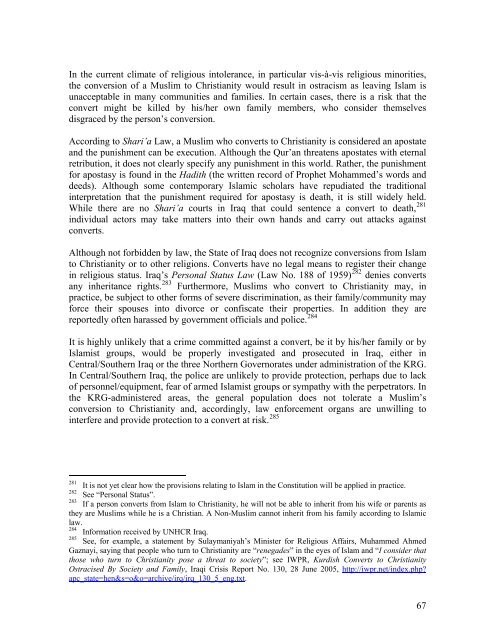UNHCR's ELIGIBILITY GUIDELINES FOR ASSESSING THE ...
UNHCR's ELIGIBILITY GUIDELINES FOR ASSESSING THE ...
UNHCR's ELIGIBILITY GUIDELINES FOR ASSESSING THE ...
Create successful ePaper yourself
Turn your PDF publications into a flip-book with our unique Google optimized e-Paper software.
In the current climate of religious intolerance, in particular vis-à-vis religious minorities,<br />
the conversion of a Muslim to Christianity would result in ostracism as leaving Islam is<br />
unacceptable in many communities and families. In certain cases, there is a risk that the<br />
convert might be killed by his/her own family members, who consider themselves<br />
disgraced by the person’s conversion.<br />
According to Shari’a Law, a Muslim who converts to Christianity is considered an apostate<br />
and the punishment can be execution. Although the Qur’an threatens apostates with eternal<br />
retribution, it does not clearly specify any punishment in this world. Rather, the punishment<br />
for apostasy is found in the Hadith (the written record of Prophet Mohammed’s words and<br />
deeds). Although some contemporary Islamic scholars have repudiated the traditional<br />
interpretation that the punishment required for apostasy is death, it is still widely held.<br />
While there are no Shari’a courts in Iraq that could sentence a convert to death, 281<br />
individual actors may take matters into their own hands and carry out attacks against<br />
converts.<br />
Although not forbidden by law, the State of Iraq does not recognize conversions from Islam<br />
to Christianity or to other religions. Converts have no legal means to register their change<br />
in religious status. Iraq’s Personal Status Law (Law No. 188 of 1959) 282 denies converts<br />
any inheritance rights. 283 Furthermore, Muslims who convert to Christianity may, in<br />
practice, be subject to other forms of severe discrimination, as their family/community may<br />
force their spouses into divorce or confiscate their properties. In addition they are<br />
reportedly often harassed by government officials and police. 284<br />
It is highly unlikely that a crime committed against a convert, be it by his/her family or by<br />
Islamist groups, would be properly investigated and prosecuted in Iraq, either in<br />
Central/Southern Iraq or the three Northern Governorates under administration of the KRG.<br />
In Central/Southern Iraq, the police are unlikely to provide protection, perhaps due to lack<br />
of personnel/equipment, fear of armed Islamist groups or sympathy with the perpetrators. In<br />
the KRG-administered areas, the general population does not tolerate a Muslim’s<br />
conversion to Christianity and, accordingly, law enforcement organs are unwilling to<br />
interfere and provide protection to a convert at risk. 285<br />
281<br />
It is not yet clear how the provisions relating to Islam in the Constitution will be applied in practice.<br />
282<br />
See “Personal Status”.<br />
283<br />
If a person converts from Islam to Christianity, he will not be able to inherit from his wife or parents as<br />
they are Muslims while he is a Christian. A Non-Muslim cannot inherit from his family according to Islamic<br />
law.<br />
284<br />
Information received by UNHCR Iraq.<br />
285<br />
See, for example, a statement by Sulaymaniyah’s Minister for Religious Affairs, Muhammed Ahmed<br />
Gaznayi, saying that people who turn to Christianity are “renegades” in the eyes of Islam and “I consider that<br />
those who turn to Christianity pose a threat to society”; see IWPR, Kurdish Converts to Christianity<br />
Ostracised By Society and Family, Iraqi Crisis Report No. 130, 28 June 2005, http://iwpr.net/index.php?<br />
apc_state=hen&s=o&o=archive/irq/irq_130_5_eng.txt.<br />
67
















